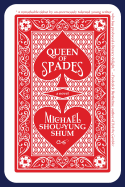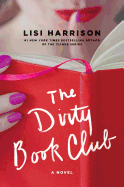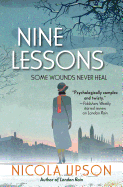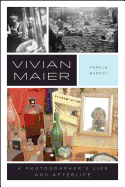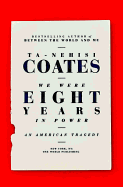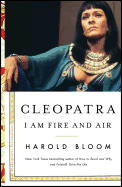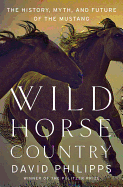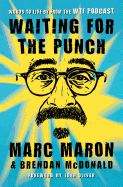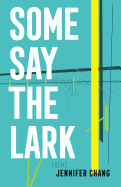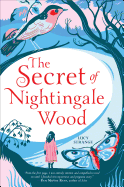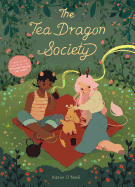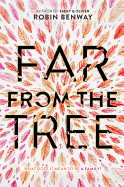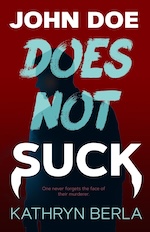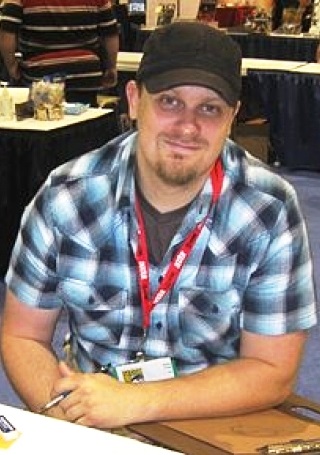 Skottie Young is a comic book artist and writer who has worked with Neil Gaiman to illustrate several novels. Young collaborated with Eric Shanower to adapt the Wizard of Oz series into graphic novel format and drew Spider-Man, Human Torch and The New X-Men for Marvel Comics. He is currently writing and illustrating his own series, I Hate Fairyland, for Image Comics. Young lives in Illinois with his wife, two sons and two dogs.
Skottie Young is a comic book artist and writer who has worked with Neil Gaiman to illustrate several novels. Young collaborated with Eric Shanower to adapt the Wizard of Oz series into graphic novel format and drew Spider-Man, Human Torch and The New X-Men for Marvel Comics. He is currently writing and illustrating his own series, I Hate Fairyland, for Image Comics. Young lives in Illinois with his wife, two sons and two dogs.
You've adapted fairytale-themed comics with Neil Gaiman (Fortunately, the Milk) and with Eric Shanower (The Wonderful Wizard of Oz series). What drew you to the genre?
I grew up watching Labyrinth and The Dark Crystal and reading The Neverending Story and the Oz books. Then, somewhere along the way, Marvel approached me and said, "Hey, we thought it would be cool to adapt the Wizard of Oz novels." I started there, and it just never stopped.
Let's talk about your artistic approaches. How does your process differ when adapting scripts for Neil Gaiman and Eric Shanower from working on your own material?
Well, working with Neil was really interesting because that was him handing over the manuscript, and me really just going through it with a highlighter and finding all the things I wanted to draw in that book. He was an amazing collaborator. When I'd show him drawings, he'd say, "Brilliant!" There was never any "No, not that way" or "No, not this way." It was my interpretation, and he loved it. It was simple.
The I Hate Fairyland comics are my dream come true. It's me playing pretend on paper with no one else's input, and it doesn't get better than that.
Writer and illustrator Molly Ostertag has said that once she told her own stories, there was no going back to doing art for other writers.
Oh yes, for sure. Illustrating a novel is a little different because there is less drawing there and, again, it really depends. Neil is one of my favorite authors, so that's a whole other ball game than spending three or four years working with another writer after you've written your own stuff in comics. I can't go back now that I've done it all. I write and I draw these stories of mine, and that's what I'm going to do forever.
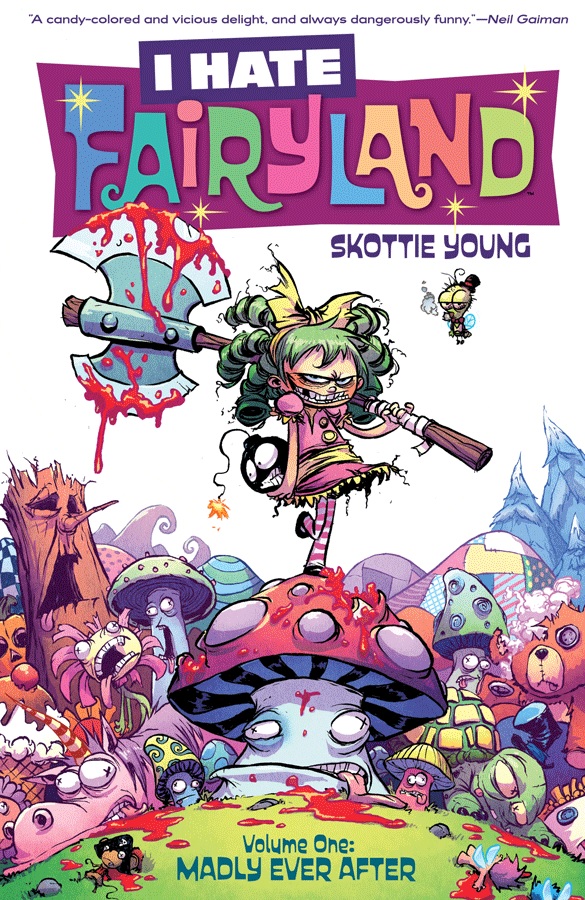 Even if Neil comes knocking on your door?
Even if Neil comes knocking on your door?
Not for a comic. It takes a long time to produce comics, so you really need it to be exactly what you intended. The best way for that to happen is for me to write it.
And how does the process on I Hate Fairyland differ from the superhero comics you've done?
It's freedom because it's mine. In a company like Image there is no oversight, there are no rules, and you can do whatever you want. That's the biggest difference. At Marvel, there's a brand they need to protect. It's on kids' shoes, backpacks, it's in movie theaters. That's a business all unto itself. When you decide to play a part in that, you have to respect it. I liken it to being able to take a Jeep onto an open field and drive however you like. Working on superheroes is like going out on a road with orange traffic cones. You're driving the car, and you're in control to a certain degree, but you're still being told where to go and where not to go. It's a difference in freedom, really.
How do you approach a typical issue of Fairyland?
The theme of the issue occurs to me first. When I finally get that, I usually sit in a room and think, "Oh, I want to do a samurai issue! How would I do that? What's that story? What kind of land would she go into? Oh, mushrooms have a samurai-esque feel, like a hat, so I'll start playing around with that." Then I write an initial script. Once I have a general concept, I write a full script for myself. That way I can get the jokes and the timing right, understand the pacing and dive into the drawing. That's where I spend the bulk of the time.
Would you let your kids read Fairyland?
My youngest is almost two and my oldest will be eight, so probably not yet, but soonish. It's definitely an ornery teen book.
Do you have any other projects in the hopper?
There is one other book that I've been chipping away at, but I can't say too much yet. I operate under this theme that if you tell your stories before you write them, your brain thinks you've told it and so your urgency to tell it is gone. --Nancy Powell, freelance writer and technical consultant
Skottie Young: Reflecting on Artistic Freedom
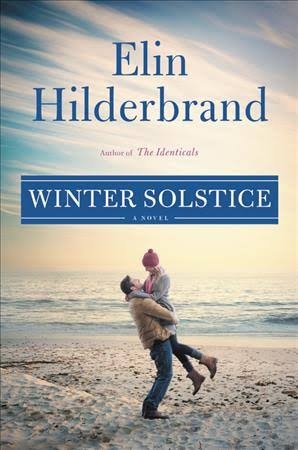 Elin Hilderbrand has expanded her trilogy of Christmas novels into a quartet with Winter Solstice, which reunites the extended Quinn family of Nantucket. This year, everyone is finally celebrating together under the same roof of the family-owned and -operated Winter Street Inn. But can the welcoming familial nest help resolve festering romantic entanglements, amid long-held traditions, heartfelt reunions and farewells?
Elin Hilderbrand has expanded her trilogy of Christmas novels into a quartet with Winter Solstice, which reunites the extended Quinn family of Nantucket. This year, everyone is finally celebrating together under the same roof of the family-owned and -operated Winter Street Inn. But can the welcoming familial nest help resolve festering romantic entanglements, amid long-held traditions, heartfelt reunions and farewells?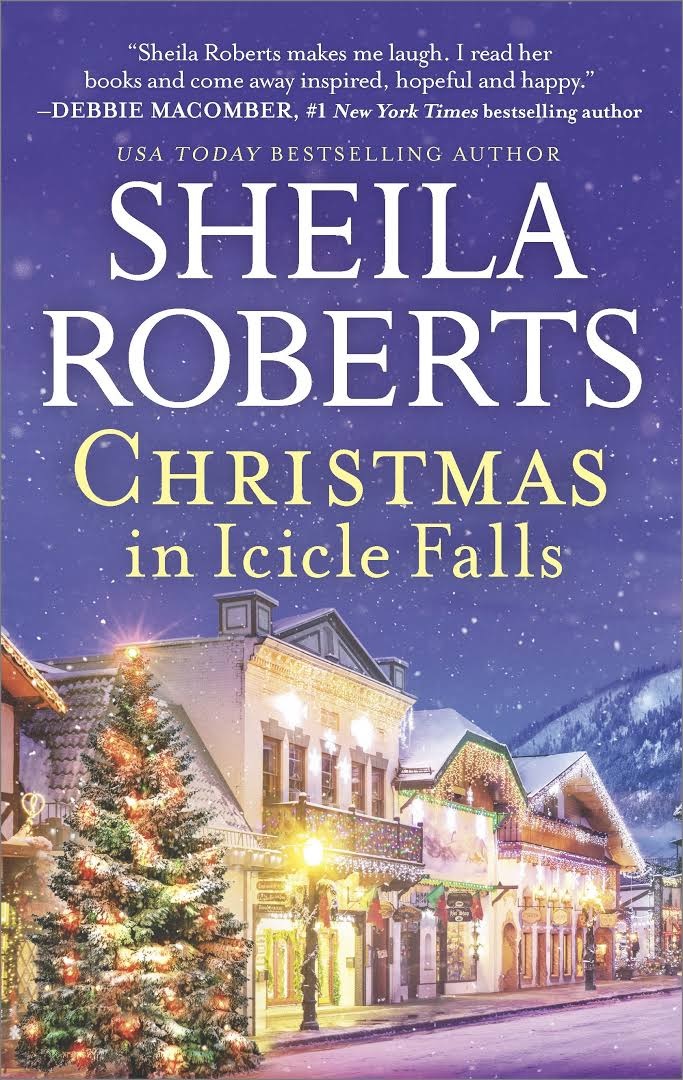 Ugly Christmas trees upend a whole community in Christmas in Icicle Falls by Sheila Roberts, where one resident in particular, a successful writer, learns that everything and everyone has potential--including an old, overlooked friend who just might hold the key to unexpected romance.
Ugly Christmas trees upend a whole community in Christmas in Icicle Falls by Sheila Roberts, where one resident in particular, a successful writer, learns that everything and everyone has potential--including an old, overlooked friend who just might hold the key to unexpected romance.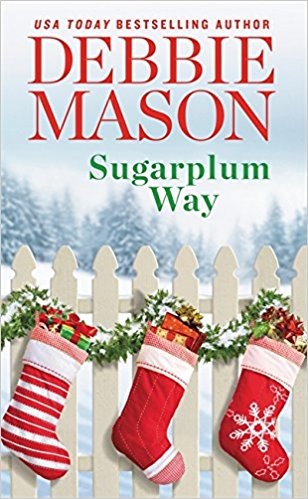 In Sugarplum Way by Debbie Mason, the future of true love is tested. A surprising, passionate kiss under the mistletoe at the town Christmas party turns the life of a romance writer--in search of her own happily-ever-after--completely upside down. --Kathleen Gerard, blogger at Reading Between the Lines
In Sugarplum Way by Debbie Mason, the future of true love is tested. A surprising, passionate kiss under the mistletoe at the town Christmas party turns the life of a romance writer--in search of her own happily-ever-after--completely upside down. --Kathleen Gerard, blogger at Reading Between the Lines



 Even if Neil comes knocking on your door?
Even if Neil comes knocking on your door?